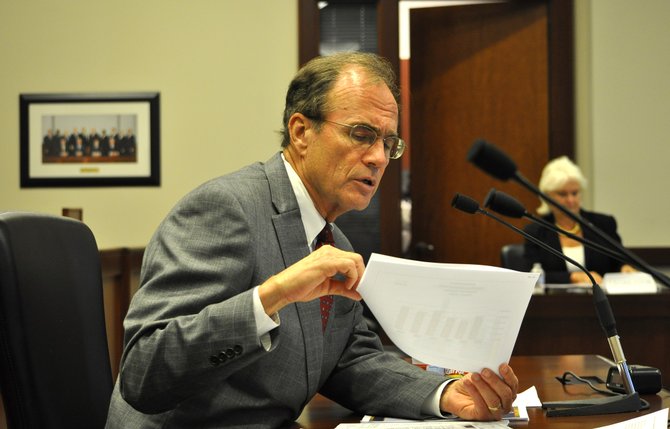Mississippi Secretary of State Delbert Hosemann plans to have the state's voter-identification law in place by spring or summer of 2014. Photo by Trip Burns
Lt. Gov. Tate Reeves may be adding a new skill to his resume: investigative reporter.
Reeves, who is chairman of the Joint Legislative Budget Hearings taking place this week in Jackson, had his staff—which includes his communications director, who used to be a newspaper reporter—dig into state-agency spending, and is asking pointed questions of agency heads making their annual appropriations requests.
When Brent Christensen, the newish executive director of the Mississippi Development Authority, presented his agency's request for a 3 percent increase over last year's $21.5 million budget, Reeves took Christensen to task over several line items from the past fiscal year.
One such expenditure Reeves singled out was MDA's practice of using proceeds to pay for its financial-resources division, which Christensen said has eight employees. Reeves said salaries should not be paid from bonds, which are often long-term debt the state takes on.
"Whoever made that decision, however many years ago, made a mistake," Reeves said before turning his attention to MDA's use of the state plane.
Specifically, Reeves wanted to know the agency's policy for using the plane and for in-state and out-of-state travel. He particularly wanted information about 14 trips on the state-owned plane where Christensen was not on board, and another expense for sending 15 employees—at an average of $3,000 each—to the annual Mississippi Picnic in New York City's Central Park this past June. Christensen defended the trip, saying it included meetings with economic prospects plus the picnic.
"It's a great opportunity for us to combine our economic development and tourism," Christensen said.
"What we're trying to do this time, this year, is really drill down to some of the individual expenses," Reeves told reporters after Monday's meeting.
In the past, lawmakers specified how much money agencies could spend on certain categories, such as travel, salaries, supplies and office space. For the past two years, they've given directors more flexibility to manage a lump sum of money.
Reeves said: "What we are now trying to determine is, has that flexibility been good for the taxpayers or has it been not so good for the taxpayers?"
Lawmakers on Monday questioned the state Forestry Commission director about a new radio system the agency is buying. They questioned the state health officer about a request for funds to renovate a 55-year-old office building. They asked a deputy treasurer about personnel expenses and the handling of long-term debt.
A few agencies, including the Forestry Commission and the state treasurer's office, are requesting more than 20 percent increases in their budgets.
Treasurer Lynn Fitch's spokeswoman, Sherri Hilton, issued a statement defending the request.
"Because this office handles hundreds of millions of dollars a day in banking transactions—$25 billion annually—it is imperative that we attract and retain accounting and investment specialists," Hilton said. "Over the last three years, the Office of the State Treasurer has seen a 48 percent employee turnover rate. The main retention issue is due to staff being underpaid and leaving to work elsewhere."
Reeves praised agencies that are requesting decreases or only modest increases. The secretary of state's office and the Insurance Department are requesting decreases. The Department of Agriculture and Commerce is seeking about a 1 percent increase.
Secretary of State Delbert Hosemann continued his practice of slashing his own department's spending and asked for 3 percent decrease, or about $1 million, less than his fiscal-year 2014 budget.
Hosemann also restated that with a recent landmark U.S. Supreme Court decision, which struck down provisions of the 1965 Voting Rights that were holding up the implementation of Mississippi's voter ID law, he expects the law to be in place by the 2014 congressional primaries.
Hosemann is considered to be a strong contender for the U.S. Senate seat if Sen. Thad Cochran chooses to retire, but has said he would not challenge Cochran in the Republican primary. Hosemann added that his office has not tapped any of the $100,000 the Legislature appropriated for legal fees related to voter ID implementation.
Voter ID, which supporters say would help stamp out voter fraud, passed through a voter referendum in 2011. Rep. Angela Cockerham, a Magnolia Democrat—the only woman and one of two African Americans on the committee—asked Hosemann for the number of voter fraud prosecutions in Mississippi.
"I have no idea, ma'am," Hosemann responded.
State revenue has grown about 5 percent annually for each of the past two years, while spending has increased about 2 percent a year. The Budget Committee will release its spending recommendations in December, and the full House and Senate will adopt a budget in the spring.
The Associated Press contributed to this story.


